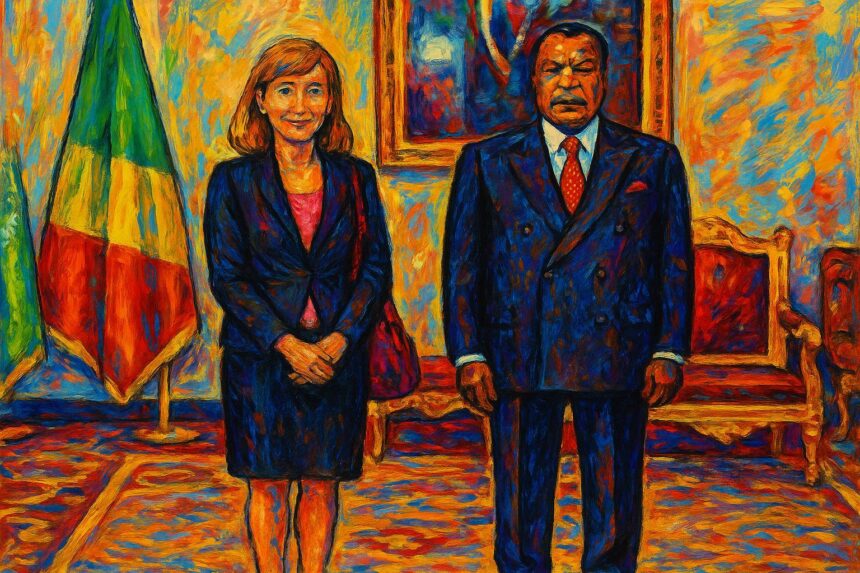Ceremonial Signals of Continuity and Change
Under the high ceilings of the Palais du Peuple, the formal presentation of letters of credence on 7 August unfolded with the precision that characterises Congo-Brazzaville’s diplomatic protocol. President Denis Sassou Nguesso, whose tenure has been marked by an emphasis on stable external relations, received three ambassadors extraordinary and plenipotentiary—Spain’s María Del Carmen Díez Orejas, South Korea’s Jeong Hong Geun and Tanzania’s Said Juma Mshana—each based across the river in Kinshasa yet tasked with nurturing bilateral agendas in Brazzaville. According to the Presidential Press Office the sequence adhered to long-standing etiquette, but the distinct professional profiles of the envoys hint at diversified priorities for the years ahead.
Madrid’s Legal Mind and Iberian Pragmatism
The first to cross the marbled hall, Ambassador Díez Orejas brings three decades of European, American and African postings and, perhaps more significantly, a legal background shaped in Spain’s post-transition era. Sources in the Spanish Foreign Ministry describe her as a “consummate negotiator” with a penchant for commercial diplomacy. Spain has historically maintained modest trade with Congo, largely confined to hydrocarbons and timber, yet Spanish companies in renewable energy and fisheries now scout Central African markets. Analysts in Madrid suggest her accreditation could advance technical cooperation on coastal management, a domain in which Congo seeks partners to diversify its blue economy.
Seoul’s Tech-Savvy Courtship
Ambassador Jeong Hong Geun, a former deputy director-general for African affairs in Seoul, follows in a tradition of Korean envoys who view Congo as a gateway to the Economic Community of Central African States. The resumption of relations in the early 1990s coincided with South Korea’s rise as a middle-power proponent of development cooperation. Today the portfolio is no longer limited to training programmes; Korea’s Export-Import Bank has signalled potential financing for transport corridors linking Pointe-Noire to hinterland mining zones, while private conglomerates study local demand for e-government solutions. “I will do my utmost to let our cooperation reach new sectors,” the ambassador wrote in the visitors’ book, echoing consultations held last month between Korea’s Ministry of Trade and Congolese officials (Yonhap News Service, 5 Aug 2023).
Tanzanian Outreach and African Solidarity
Concluding the ceremony, Ambassador Said Juma Mshana framed his mission in terms of intra-African solidarity. Tanzania and Congo, both pillars of the African Union’s Central-East axis, share converging interests in peacekeeping and the harnessing of the Congo Basin’s ecological capital. Dar es Salaam’s experience in port logistics and Kiswahili-driven cultural diplomacy could complement Brazzaville’s ambition to serve as a regional service hub. Commentators at the Institute of Security Studies note that closer defence cooperation, particularly in riverine security, would assist broader AU objectives in counter-piracy along the Gulf of Guinea.
Strategic Implications for Brazzaville
Taken together, the trio of appointments underscores Brazzaville’s practice of balancing traditional partners with emerging ones, an approach that preserves room for manoeuvre amid flux in global power dynamics. The geographic spread—from Southern Europe to Northeast Asia and the Swahili Coast—mirrors Congo’s intent to court capital and expertise without aligning too rigidly with any single bloc. In conversations with senior officials at the Congolese Ministry of Foreign Affairs, emphasis is placed on “pragmatic deliverables” such as infrastructure finance, agritech transfer and maritime security training rather than purely symbolic exchanges.
Quiet Diplomacy, Tangible Expectations
Diplomats familiar with central African postings routinely underscore the logistical challenge of serving from Kinshasa while covering Brazzaville. Yet the proximity of the two capitals also affords a unique laboratory for cross-border initiatives, from shared health surveillance to digital customs systems. President Sassou Nguesso’s reception of the three ambassadors, observers argue, reaffirms his administration’s priority of fostering an enabling environment for foreign investment while projecting an image of institutional continuity. With the formalities concluded, the onus now shifts to working-level teams to translate cordial handshakes into contracts, technology transfers and joint statements that resonate beyond the Mfoundi River’s banks.



















